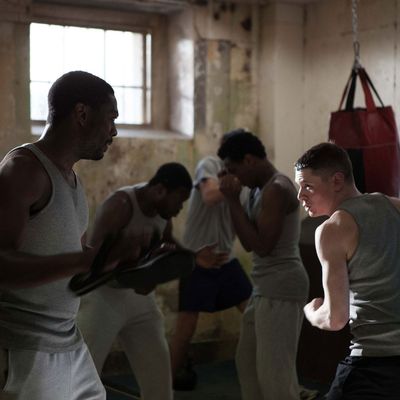
As Eric Love, a violent teenager transferred earlier than normal — “starred up,” in the local argot — to a maximum-security adult British prison, the young actor Jack O’Connell lopes down the main corridor of cells radiating insolence, ready to strike back before anyone thinks to strike first. It’s a remarkable performance, both huge and subtle, not just for the ways in which O’Connell suggests Eric’s volatility in repose, but also for how he evokes the teen’s bitter wit. O’Connell wrinkles his forehead in mock bemusement the way Sean Connery used to, as if Eric is puzzling out a question to which he knows — and has always known, since before he could talk, probably — the answer. That answer is, of course, that he can depend on no one, and that everyone on earth is inclined to hurt him. He has barely arrived in the prison before he makes a run at the guards, latching onto one’s testicles with his teeth, practically inviting them to beat him down so that he can rise back up, bloody but in control. His hair-trigger hostility to authority figures makes things very confusing when, in the course of Starred Up, he’s confronted by two father figures, one an earnest group therapist named Oliver Baumer (Rupert Friend), the other his actual father, Neville (Ben Mendelsohn), a dominating inmate whom Eric barely knows. The psychodrama is so thick, you can cut it with a straight razor.
Starred Up is an edgy, teeming thriller, brilliantly disorienting, making strange a world we thought we knew, at least from other movies. (I can’t discount the idea that some of the strangeness comes from the frequent unintelligibility of the dialogue, the words as impenetrable — at least to us Yanks — as they are convincing.) Director David Mackenzie and writer Jonathan Asser have created an ecosystem in which the blandly contemptuous “deputy governor” (Sam Spruell) has largely ceded control to the inmates, in which guards step in to quell the more egregious brutality but in the main allow (and at times abet) the hierarchy among prisoners. At the top of that ladder is a bespectacled inmate named Spencer (Peter Ferdinando), who sits in his cell before a chessboard, his hands free of blood but his mind meting out punishments and rewards. Slightly below him is Eric’s dad, who is suddenly, visibly flummoxed by what he perceived to be the responsibilities of fatherhood.
In Animal Kingdom, Mendelsohn played a psychotic mama’s boy with a near-sexual lust for control, and the more you watched him, the more frightening he became. He has a bit of that deadliness here — Neville is wired for conflict — but it’s tempered by tenderness, first for his cellmate and lover, then for the son he wants to protect. No, not just to protect. To guide. To oversee. Watching Eric ally himself with black prisoners makes him puzzled and anxious. And he’s driven to near-madness by the therapist, Baumer, whom he wants to help his son but also regards as a “posh boy” with airs — and a threat to his own influence. Neville can’t decide where he stands.
The do-gooder counselor is the film’s most familiar figure, but there’s a grim joke at the center of the group therapy scenes: These men are so prone to confrontation and so hypersensitive to slights that they’re always insulting one another’s mothers and then flying into rages. Nothing can ever get going. And while Eric — who attacks guards and prisoners alike with little provocation — does indeed need to develop self-control, Baumer might well be baumy for believing that helping prisoners open themselves up and be more “vulnerable” will equip them for survival in a facility full of predators. In any case, Baumer doesn’t seem long for this world. The higher-ups regard his humanism as misguided and a threat to their order.
Mackenzie and Asser aren’t nihilists, which can make all the difference in a prison movie. They see the logic behind the system, even if they loathe it. Every man in this two-tiered facility is busy doing something to give his life a purpose. Every man has his reasons, shortsighted as they may be. And though the tempo of Starred Up is jangly, the filmmakers build in moments of silence, in which Eric is alone in his cell, his guard down long enough to let him breathe. They and O’Connell never let us forget that Eric is a boy and that it’s possible to grow and change and find one’s humanity even in the most malignant of settings, to be — even behind bars — free.


